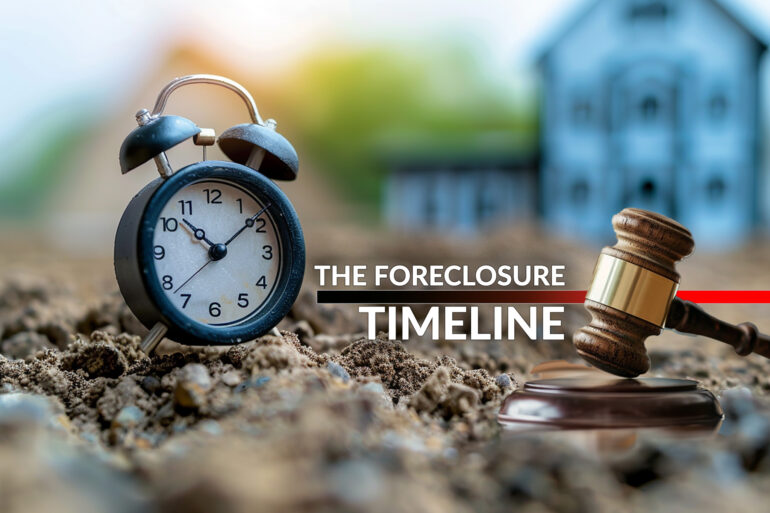What is the Foreclosure Timeline?
Just hearing the word “foreclosure” can send chills down most people’s spines. Simply put, foreclosure is a legal process where a lender (typically a bank) attempts to recover the loan balance from a borrower who has stopped making payments by forcing a sale of the asset (the house/property) used as collateral for the loan. In other words, the bank takes possession of a home and sells it to regain as much of its money as possible.
Understanding the foreclosure process in your target market allows you to identify potential deals, navigate legalities, and ultimately secure profitable investments. Foreclosure auctions present opportunities to purchase properties below market value. This initial discount can translate into significant savings, boosting your investment returns. Understanding the timeline and potential roadblocks can give you a competitive edge.
Let’s take a look at the foreclosure timeline to give you a better idea of what to expect.
Stage 1: Missed Payments
A default occurs when a homeowner fails to make mortgage payments as agreed in their loan terms. Most lenders won’t jump straight to foreclosure after a single slip-up. A series of defaults, however, is when the lender typically decides to take legal action.
The pre-foreclosure stage often goes unnoticed by casual investors. Here’s where your research and alertness come into play. Look for properties with late payment notices or “lis pendens” filings (notice of lawsuit) attached. These can be early indicators of potential foreclosure opportunities.
Proactive Strategies
- Network with local real estate agents. Experienced agents can keep you informed about pre-foreclosure listings and upcoming auctions.
- Monitor county clerk websites. Public foreclosure filings are typically accessible online, allowing you to identify properties in the early stages of the process.
Stick to your bidding strategy. Don’t get carried away in the auction heat. Remember, your goal is to acquire the property at a profitable price.
Stage 2: Notice of Default
After a series of missed payments, the lender will send a notice of default. This document formally notifies the borrower that they are not meeting their mortgage obligations. This notice indicates that the lender is preparing to reclaim the property unless the payments are resumed or renegotiated. This document also starts the foreclosure clock ticking. Florida’s statute of limitations for filing a foreclosure lawsuit after a default is five years. In Ohio, the statute is only four years.
Investor Action
- Research the property. Use the public notice information to identify the property and gather details like location, size, and estimated value.
- Preliminary valuation. Conduct a comparative market analysis (CMA) to estimate the property’s fair market value. This estimate will help you determine your maximum bid at auction.
- Consult with a real estate attorney. An attorney can advise you on legalities specific to the foreclosure process and potential title issues associated with the property.
Stage 3: Foreclosure Lawsuit and Legal Process
The property owner can rectify the situation by making back payments, modifying the loan, or taking another mutually agreed-upon action with the bank. If no efforts are made or are not viable, the lender files a foreclosure complaint with the courts, marking the legal process’s formal beginning.
While the legal complaint gets the wheels turning, the foreclosure doesn’t happen immediately. The court assigns a case number and attempts to serve the homeowner. Serving the homeowner with the foreclosure notice isn’t always easy, especially if the homeowner is no longer at the property. After exhausting attempts to serve the homeowner, the lender can use other methods, like service by publication, to provide notice.
Once the homeowner is served, they have a set period to respond. In Florida, this is typically around 20 days; in Ohio, it is 28 days. They can admit to the claims, deny them, or include an affirmative defense, explaining reasons for the default that could influence the proceeding. Being served initiates a period of discovery, where both sides gather evidence. The duration of this stage can vary depending on the case’s complexity.
Stage 4: Discovery and Judgement
We’re now in a period of discovery, a time when both sides can gather evidence to support their respective positions. This phase can last anywhere from 45 to 90 days and involves detailed scrutiny of documents and evidence.
Homeowners hire attorneys during this stage to handle the complexities of legal defenses and possibly negotiate solutions with the lender. If the case moves beyond discovery without a deal being made, it proceeds to summary judgment. In a summary judgment, the court may decide in favor of the lender if the homeowner’s defenses are insufficient to warrant an actual trial. If the homeowner has a good case, it can go to trial, where the judge will hear all the evidence and facts before ruling. Again, the length of this stage can vary depending on the situation’s complexity.
Investor Considerations
- Stay informed. Regularly check court records to track the progress of the foreclosure lawsuit.
- Prepare for the auction. Research auction procedures and requirements specific to your target county. In some cases, pre-qualification for bidding might be necessary.
After the auction, several important steps remain before an investor can claim property ownership.
Stage 5: Judgement, Auction, and Outcomes
The court will ultimately issue a judgment. If the judgment favors the homeowner, the bank cannot take possession of the property. While rare, this can happen. The property will be scheduled for public auction if the court favors the lender. Now is the moment real estate investors can shine.
Real estate auctions allow participants to bid on foreclosed properties. The procedures vary slightly between states but generally involve an open bidding process conducted online or at a physical location like a courthouse.
Winning Strategies
- Set a realistic budget. Factor in potential renovation costs and holding expenses when determining your maximum bid.
- Arrive early and prepare. Be aware of registration deadlines and any required documentation for participation in the auction.
- Stick to your bidding strategy. Don’t get carried away in the auction heat. Remember, your goal is to acquire the property at a profitable price.
How PropertyOnion Can Assist Investors
PropertyOnion provides a robust platform aggregating auction listings and critical property information for those navigating property auctions. This tool is invaluable for investors, offering a streamlined approach to identifying and researching potential properties without sifting through multiple sources.
Understanding the foreclosure process and timeline is essential for making informed and profitable real estate investment decisions.
Stage 6: Post Foreclosure and Taking Ownership
Securing a winning bid at a foreclosure auction is just the beginning. After the auction, several important steps remain before an investor can claim property ownership. These include finalizing the payment, receiving the certificate of title, and, if necessary, managing the eviction process.
PropertyOnion’s Support in Post-Auction Activities
PropertyOnion simplifies post-auction complexities through services like title searches and skip tracing. Our platform ensures that investors can find and buy properties and handle the post-purchase landscape easily, from ensuring clear titles to contacting previous owners if necessary.
Leveraging PropertyOnion for Foreclosure Investments
Investing in foreclosed properties can be highly profitable, requiring knowledge, timing, and strategic action. PropertyOnion helps users make informed decisions by offering tools that provide real-time alerts, comprehensive property inventories, and the ability to download spreadsheets and data for offline analysis. We also offer 1-on-1 Training based on your experience and goals. These aren’t pre-recorded video or book lessons; you work with one of our Foreclosure Auction Professors to meet your investment goals.
Maximizing Foreclosure Opportunities
Understanding the foreclosure process and timeline is essential for making informed and profitable real estate investment decisions. Whether you’re a seasoned investor looking to expand your portfolio or a newcomer eager to make your first investment, having the right tools and information is key to success.
With PropertyOnion’s powerful tools and training, you’ll be on your way to making smart investments. With personalized training, expert support, and real-time data, you’re well-equipped to maximize your investment returns. Don’t miss out on the opportunity to transform your real estate investment strategy — explore PropertyOnion’s resources and start making smarter investment choices now.








